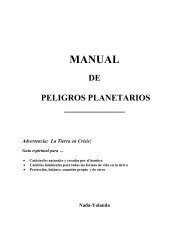ALIEN INTERVIEW - THE NEW EARTH - Earth Changes and The ...
ALIEN INTERVIEW - THE NEW EARTH - Earth Changes and The ...
ALIEN INTERVIEW - THE NEW EARTH - Earth Changes and The ...
You also want an ePaper? Increase the reach of your titles
YUMPU automatically turns print PDFs into web optimized ePapers that Google loves.
<strong>The</strong> most beautiful among the beautiful…<br />
My springtime, my merry faced love, my daytime, my sweetheart, laughing leaf…<br />
My plants, my sweet, my rose, the one only who does not distress me in this world…<br />
My Istanbul, my Caraman, the earth of my Anatolia<br />
My Badakhshan, my Baghdad <strong>and</strong> Khorasan<br />
My woman of the beautiful hair, my love of the slanted brow, my love of eyes full of<br />
mischief…<br />
I'll sing your praises always<br />
I, lover of the tormented heart, Muhibbi of the eyes full of tears, I am happy."<br />
Roxelana, as she is better known in Europe, is well-known both in modern Turkey <strong>and</strong> in the<br />
West, <strong>and</strong> is the subject of many artistic works. She has inspired paintings, musical<br />
works (including Joseph Haydn's Symphony No. 63), an opera by Denys Sichynsky, a<br />
ballet, plays, <strong>and</strong> several novels."<br />
-- Reference: Wikipedia.org<br />
243 "... Queen Elizabeth..."<br />
Elizabeth I (7 September 1533 – 24 March 1603) was Queen of Engl<strong>and</strong> <strong>and</strong> Queen of<br />
Irel<strong>and</strong> from 17 November 1558 until her death. Sometimes called <strong>The</strong> Virgin Queen,<br />
Gloriana, <strong>The</strong> Faerie Queen or Good Queen Bess, Elizabeth was the fifth <strong>and</strong> last monarch<br />
of the Tudor dynasty. <strong>The</strong> daughter of Henry VIII, she was born a princess, but her mother,<br />
Anne Boleyn, was executed three years after her birth, <strong>and</strong> Elizabeth was declared<br />
illegitimate. Perhaps for that reason, her brother, Edward VI, cut her out of the succession.<br />
His will, however, was set aside, as it contravened the Third Succession Act of 1543, in<br />
which Elizabeth was named as successor provided that Mary I of Engl<strong>and</strong>, Elizabeth's halfsister,<br />
should die without issue. In 1558, Elizabeth succeeded her half-sister, during whose<br />
reign she had been imprisoned for nearly a year on suspicion of supporting Protestant<br />
rebels.<br />
Elizabeth set out to rule by good counsel. One of her first moves was to support the<br />
establishment of an English Protestant church, of which she became the Supreme Governor.<br />
This Elizabethan Religious Settlement held firm throughout her reign <strong>and</strong> later evolved into<br />
today's Church of Engl<strong>and</strong>. It was expected that Elizabeth would marry, but despite several<br />
petitions from parliament, she never did. <strong>The</strong> reasons for this choice are unknown, <strong>and</strong> they<br />
have been much debated. As she grew older, Elizabeth became famous for her virginity,<br />
<strong>and</strong> a cult grew up around her which was celebrated in the portraits, pageants <strong>and</strong> literature<br />
of the day.<br />
One of her mottos was video et taceo: "I see, <strong>and</strong> say nothing".<br />
This strategy, viewed with impatience by her counselors, often saved her from political <strong>and</strong><br />
marital misalliances. Though Elizabeth was cautious in foreign affairs <strong>and</strong> only half-heartedly<br />
supported a number of ineffective, poorly resourced military campaigns in the Netherl<strong>and</strong>s,<br />
France <strong>and</strong> Irel<strong>and</strong>, the defeat of the Spanish armada in 1588 associated her name<br />
forever with what is popularly viewed as one of the greatest victories in British<br />
history. Within twenty years of her death, she was being celebrated as the ruler of a<br />
golden age, an image that retains its hold on the English people. Elizabeth's reign is known<br />
as the Elizabethan era, famous above all for the flourishing of English drama, led by<br />
playwrights such as William Shakespeare <strong>and</strong> Christopher Marlowe."<br />
316





